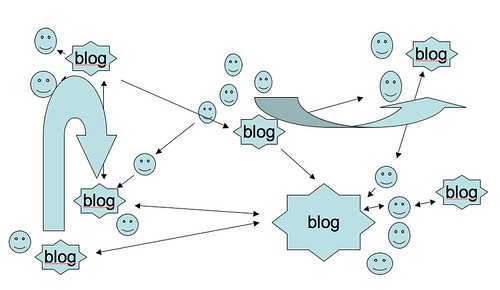OLDaily
by Stephen Downes
October 10, 2008
The Rise and Rise of the YouTube Generation, and How Adults Can Help
I have thought from time to time about creating a video dairy or some such thing, but it has seemed like a lot of work for a little return. Would people even watch it? Should it focus on learning, or would everything be fair game? On the other hand - there's a certain skill there, it's a skill at least some adults should master. Still, the people described in this article seem to have things well in hand. As one comments, "Thirty thousand, one hundred people watch me now and it'd be very unfair of me to suddenly stop and say 'just go watch someone else'."
Bobbie Johnson,
The Guardian,
October 10, 2008 [Link] [Tags: Video, Adult Learning, YouTube]
[Comment]
By the Blog: Academics Tread Carefully
The Times Educational Supplement looks at academic blogging in the U.K. Of greatest value is the long list of blogs appended to the article, many of which I read on a regular basis. "Although they are still lagging behind their colleagues in the US, British academics are slowly but surely moving into the blogosphere. The appeal of academic feedback, as well as the opportunity for public engagement and the potential for enhancing reputations, has those who blog hooked." Via Emma Place, who also links to a set of reports on academic blogging from Intute blogger Paul Ayres.
Zoe Corbyn,
The Times,
October 10, 2008 [Link] [Tags: Great Britain, Academia, Web Logs]
[Comment]
Using Blogs to Enhance Learning - Some Helpful Tips

"Blogs can be used to encourage students to summarize what they have learned as well as for comparing and contrasting various aspects of what they have internalized. As students begin to articulate their thoughts blogs can help them feel a sense of empowerment as they develop their own voice. Throughout the process, blogs can therefore lay out the entire "learning journey" students have been on, helping them become more reflective about the learning process."
Thomas,
openeducation.net,
October 10, 2008 [Link] [Tags: Online Learning, Flickr, Web Logs]
[Comment]
Experiments With Video Blogging To Support Presentations
brian kelly - who has been writing a string of good posts recently - looks at using video to support presentations. for my own part, I rarely use a video during a presentation (because I never know what to do while it's playing, I just stand there and fidget). But I often record presentations and use video to support my work generally. In this case, Kelly responds to a suggestion from Andy Powell that amateur video production is so bad that video "is a nice gimmick (in this case) but no more." Kelly Responds, "But should we leave video production to the experts? I don't think so, but your view may differ." To me, what we are seeing reminds me of the early days of HTML, when some web pages were just awful. We rarely see that any mare - not because people became better HTML programmers, but because the tools made HTML programming unnecessary. The same will be true of video.
Brian Kelly,
UK Web Focus,
October 10, 2008 [Link] [Tags: Video]
[Comment]
The Connected Economy
This is another one of those attempts to depict the current economic crisis as being caused by 'non-obvious connections' and 'complexity'. I disagree. The crisis was caused by a lack of regulation which resulted in an environment in which banks could bundle extremely risk loans (such as subprime mortgages) and represent them as trustworthy bank-backed paper. Now the banks don't trust each other because they realize that, as an industry, they have been dishonest. If it weren't for the innocent victims of the crash - which is to say, everyone else, with whose money the banks and financial companies were engaged in high-risk gambling - I would laughing my head off at the comeuppance. When governments (yes, governments) put the pieces back together, the financial system will be regulated, and essential industries - such as health, pensions, education and housing - will be taken out of their hands. If you want to draw a comparison with networks to explain the crash, don't point to complexity - point to things like spam and phishing and viruses and the rest.
Nat Torkington,
O'Reilly Radar,
October 10, 2008 [Link] [Tags: none]
[Comment]
Externalizing Content - Flash and XML for eLearning Development - The Perfect Marriage
Skip the first two paragraphs of this post, which amount to an exceptionally awkward opening, and begin with the third paragraph for an exploration of how Flas and XML combine in e-learning. "Here's basically how it works: XML stores the content and references to content and Flash reads in that XML to display it in a way the learner can get to and interact with the content. Separating the content from the framework of the course provides big benefits." I've messed around with this a bit; the problem is that I am too cheap to pay for a Flash development platform, which means I can only use pre-existing Flash applications to display my XML. More from this new blog.
Garin Hess,
eLearning Juice ... from Concentrate,
October 10, 2008 [Link] [Tags: Traditional and Online Courses, Online Learning, XML, Web Logs, Metadata]
[Comment]
This newsletter is sent only at the request of subscribers. If you would like to unsubscribe,
Click here.
Know a friend who might enjoy this newsletter? Feel free to forward OLDaily to your colleagues. If you received this issue from a friend and would like a free subscription of your own,
you can join our mailing list. Click here to subscribe.
Copyright 2008 Stephen Downes
Contact: stephen@downes.ca
This work is licensed under a
Creative Commons License.